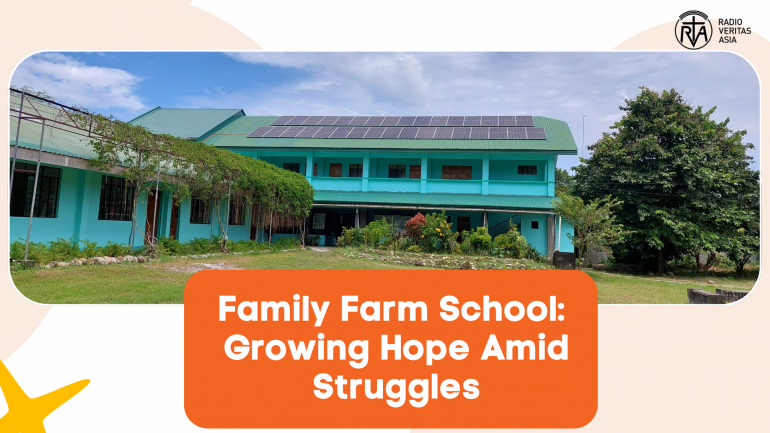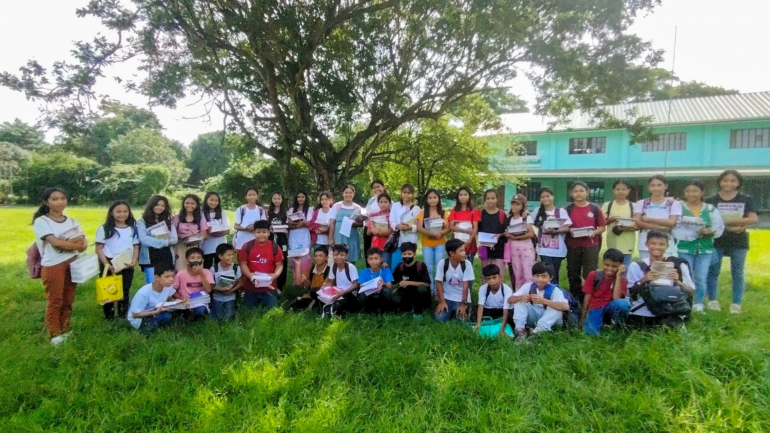Family Farm School: Growing Hope Amid Struggles

The Family Farm School (FFS) in Roxas, Oriental Mindoro, Philippines, should have closed down two decades ago. Financial troubles and waning interest in farming nearly ended its story in just four years.
Yet, the persistence of those who believed in its mission carried it through. Now in its 24th year, the school continues to mold young people and their families, an oasis of hope in a society where agriculture is undervalued and materialism often reigns.
“Due to financial difficulties, it almost closed in 2004,” recalled Executive Director Mina Ballesteros. “But evaluation showed how much our students were growing, not only in academics but also in their respect for self, others, the environment, and their connectedness with God.”
Parents, too, refused to give up. “Please continue,” begged mother Lucy Rondael back then. “That’s where my son, who used to be a headache, learned to appreciate farming and began helping his father plow the field.”
A School Born of Convergence
The idea for FFS traces its roots to 1935 in rural France, where a Catholic priest and his parish council began a model of education linking classroom learning to farm life. The model spread across Europe and later to Asia. In the Philippines, the first Family Farm Schools were established in Batangas in 1988, thanks to a philanthropist who believed in the approach.
Inspired by exposure to those pioneering schools, clergy and lay leaders in Oriental Mindoro brought the idea home. With the blessing of then-Bishop Warlito Cajandig, and the leadership of the late Mayor Gelacio Yason, the first FFS in the province opened its doors in 2001.
The early years were anything but easy. Operating costs piled up while the school served mostly indigent families at highly subsidized rates. Salaries for teachers had to be covered by loans from a parish, eventually amounting to ₱1.3 million. Even now, the debt is slowly being repaid.
Despite these struggles, trust from donors and the dedication of volunteers, such as the Jesuit Volunteers Philippines and the Australian Volunteers for International Development, allowed the school to grow. Today, FFS stands on a spacious property with organic gardens, classrooms, a computer laboratory, a science lab, and a library. From its first batch of 16 students, it now serves 267 learners and has produced 541 graduates.
The Four Pillars of Learning
What sets the Family Farm School apart is its holistic formation anchored on four key pillars:
1. Integral Youth Formation
FFS goes beyond academics. Students are trained in professional, social, and economic development, while also grounding their lives in care for the environment and spirituality. Programs like organic farming, waste segregation, and even practices such as Pranic Healing and Capacitar workshops are integrated into their learning.
2. Alternancia
This unique approach allows students to learn both inside and outside the classroom. For instance, Grade 7 and 8 students work on “Paksa” or themes, such as self, family, and organic farming, by formulating questions, seeking answers in their communities, and presenting synthesized learnings.
Older students take on the Family Enterprise Project, an entrepreneurial venture developed with their parents. One alumnus’ project in cattle raising helped finance his college education and continues to support him as he prepares for his engineering board exams.
Field visits to organic farms and regular family visitations also help bridge school lessons and home practices. Parents even assess their children’s growth through a “Kwaderno ng Ugnayan,” a tool measuring character and skills.
3. Responsible Association
Parents play an active role in school life. They undergo their own formation programs, ensuring that education is a family endeavor rather than just a student’s responsibility.
4. Rural Development
Ultimately, the school aims to transform not just individuals, but entire communities. The values and skills instilled in students ripple through their families, strengthening the agricultural and social fabric of their barangays.

Challenges in a Changing World
But sustaining such a model is not easy. “Although we have complete facilities, we lack enough funds for maintenance and teacher salaries,” admitted Ballesteros, who once gave up her salary for two years to keep the school afloat.
Another challenge is perception. Many young people see farming as backward or unprofitable. While FFS teaches them its value, the cultural stigma remains. To address systemic challenges, advocates successfully lobbied for the Rural Farm School Law in 2013. Yet the law excluded provisions for private FFS institutions, leaving schools like Roxas still struggling for subsidy. Ballesteros and her colleagues continue to push for amendments.
Looking Ahead with Hope
Despite the odds, the school looks forward to the future. By 2028, it hopes to grow its student population to 500–600, helping decongest nearby public schools where enrollment tops 1,500.
“Aside from regular subsidies for private schools, we can do this if we get the support we need from government agencies like TESDA, the Department of Agriculture, and the Agricultural Training Institute,” said Ballesteros, a sociology graduate of the University of the Philippines Los Baños.
She also hopes for stronger communication and branding support to spread awareness of the FFS model. “It’s not just about the quality education we offer,” she explained. “We need to reach more hearts and minds.”
As the Family Farm School marks its 24th year, its community leans on faith and perseverance. They hold on to the wisdom of their early supporters: from the late Mayor Yason, “Don’t focus on the problem for it weakens you; instead set your vision on the good this will do for the people”, to Father Alan Meechan, SVD, “When you are doing good, God will make a way.”
In a world often obsessed with quick wealth and digital distractions, the Family Farm School remains a quiet reminder: real growth is cultivated patiently, on the land and in the human spirit.








